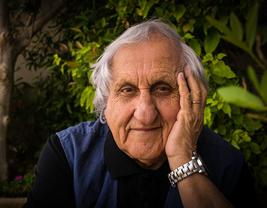 |
|
| A.B. Yehoshua | |
Israeli novelist A.B. Yehoshua, who, "along with other acclaimed storytellers, planted his nation on the map of world literature with human portraits that captured the discordant condition of living in a land fraught with moral and political conundrums," died June 14, the New York Times reported. He was 85.
Yehoshua was among the first writers of fiction "to give literary expression to the suffering and moral dilemmas" set off by the war that followed Israel's declaration of independence in 1948, said Sidra DeKoven Ezrahi, professor emeritus of comparative literature at Hebrew University in Jerusalem.
Over the course of 11 novels, three short-story collections and four plays, Yehoshua "tackled a variety of narrative forms--from surrealist to historical--and delved into knotty or uncommon subjects," the Times noted. His books include The Lover; A Late Divorce; Five Seasons; Mr. Mani, which won the National Jewish Book Award for fiction; Open Heart; The Liberated Bride; A Woman in Jerusalem; Friendly Fire: A Duet; The Retrospective; The Tunnel; The Death of the Old Man; and The Terrible Power of a Minor Guilt.
"Nearly every one of Buli's fictions changed the conversation and constituted an innovation in modern Hebrew fiction, either in form or content," said DeKoven Ezrahi, using the writer's nickname.
In a video profile of Yehoshua as a 2017 recipient of Israel's Dan David Prize, the author said, "Laughter and tears are the best vitamins for good writing."
Yehoshua's books were translated into 28 languages. He won the Israel Prize, awarded annually by the state for important cultural contributions, and in 2005 he was shortlisted for the first Man Booker International Prize, then given for an entire body of work.
"In one movement of his imaginative wings, he would show us just how banal and absurd, just how the reality--especially of ours, in Israel--is surrealistic," Israeli novelist David Grossman observed.
Yehoshua's legacy "is a complex one," the Guardian wrote. "He repeatedly urged diaspora Jews to return to Israel and at the same time championed Palestinian rights. To the outside world, this may have seemed a contradiction, but to the Israeli left, such dreams and ideals were necessary in the dark intifada years. Certainly Yehoshua was never afraid to criticize his people for their attachment to the diaspora. 'Even Abraham chose exile rather than the Promised Land. And he was the first Jew,' he said."

